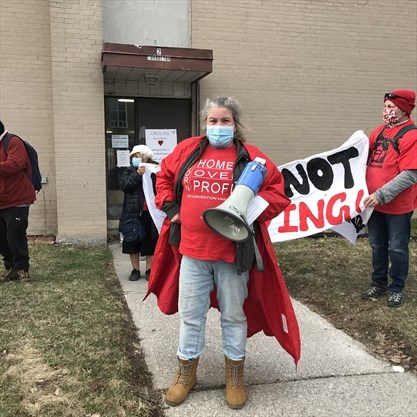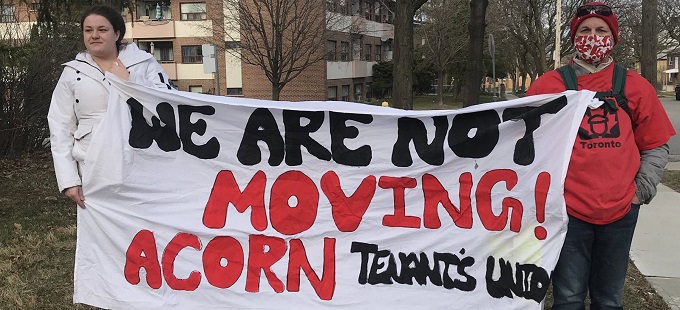Toronto.com: ‘I’m not moving’: Most Rexdale townhouse tenants are fighting owner’s eviction
Posted April 7, 2021
Posted April 7, 2021
A dozen working class families, many who’ve lived decades in their Rexdale townhomes, continue to fight back against their landlord’s “renoviction.”
“I’m not moving,” said Patricia Edwards, 52, who lives with her daughter, 24, and three cats in one of 20 townhouses at 25 Leduc Dr. and 2 Torbolton Dr. “Not until I’m before the (Ontario) Landlord and Tenant Board and they tell me I’ve got to go.”
Last week, Edwards joined the majority of her neighbours, who held banners and placards that read, “Resist Renoviction” and “We Are Not Moving” at a rally on March 31, their deadline to move out.
Landlord Michael Klein did not respond to our requests for comment before our publication deadline.
Last Nov. 4, a day after new owner Klein acquired the buildings, tenants received a letter notifying them they’d have to move out by March 31. N13 notices followed, which allow a landlord to end tenancy for “extensive” renovations.
The letter offered residents $5,000, nearly $1,700 more than the Residential Tenancies Act requires, which is three months’ rent. Seven or eight tenants have since taken the money and moved.
Tenants pay around $1,110 a month for their two-bedroom townhouses with basement and backyard in the Islington Avenue and Rexdale Boulevard area.
Family Properties, owned by Klein, lists the renovated townhouses to new tenants for $2,400.
 Edwards’ message to Klein: “Where’s the empathy? It’s all about money. It’s how fast they can do a turnaround. It’s people’s lives.”
Edwards’ message to Klein: “Where’s the empathy? It’s all about money. It’s how fast they can do a turnaround. It’s people’s lives.”
Most families have lived there 20, 30, even 40 years.
For 42 years, Karin and Will Newman have lived in their Rexdale townhouse. They raised their sons there. Now retired, living on fixed incomes, they can’t afford market rent.
“It’s very stressful,” said Newman, 70. “My husband and I are up and down constantly. Neither of us are sleeping well. I thought I’d live here a few more years before I go to a seniors’ home. We tried to get (Klein) to talk to us. They just want the $2,400. They just want us out.”
Katherine Zei, an Etobicoke ACORN member, said it’s time for the city of Toronto to legislate a stop to “renovictions” and follow the example of Burnaby, B.C.
There last year, ACORN won protections to stop tenant evictions, including a building licensing system, rental top-up for renovation-displaced tenants and more city oversight.
“The fact that renovictions are occurring during a pandemic, points to a clear gap in legislation that is failing to protect the most vulnerable,” Zei said in an email. “We’ve been fighting to get tenant protections from renovictions and demovictions, similar to what Burnaby has. ACORN is also fighting for a no displacement policy.”
With the help of Toronto ACORN, the largest tenant union in North America, tenants received a $10,000 tenant support grant from the city of Toronto to help cover legal support.
It’s the first time the grant was approved for a “renoviction,” an ACORN spokesperson said.
Now the tenants face a battle at the Ontario Landlord and Tenant Board.
Paralegal Ian Shemesh with Eviction.Sucks, who represents the tenants, called it “a terrible situation all around”.

“These tenants built their lives there, forged relationships, and during the pandemic, many have lost their jobs. Now, they’re being relocated,” Shemesh said. “I feel for them. There’s also a human factor. It’s not all about money.”
Klein has 30 days from March 31 to file to the board a L2 application for an order to evict the tenants.
A “reasonable settlement” at the board is Shemesh’s hope.
Shemesh said he will challenge whether Klein’s renovations are “sufficient enough to meet the criteria of a N13 and trigger eviction.”
A N13 enables a landlord to end tenancy to do repairs or renovations “so extensive” that a building permit is required, and the unit must be vacant to do the work.
“It’s taking advantage at such a bad time during COVID when people are living down and out,” Shemesh said.


***
Article by Tamara Shephard for Toronto.com

